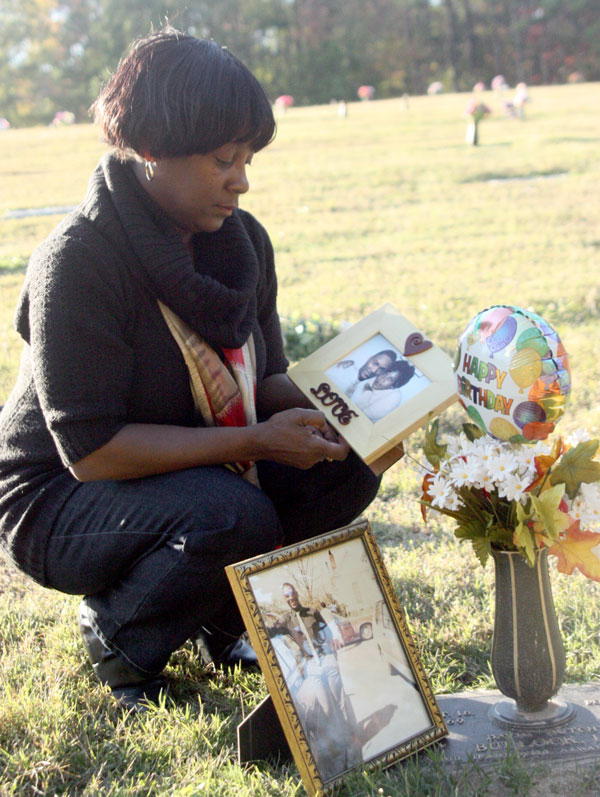By Kendra McNair-Worley
NCCU Staff Writer
the Durham VOICE
thedurhamvoice@gmail.com
Each year in America, nearly 17,000 people are murdered. Left behind are family members and friends who are filled with unimaginable grief and confusion. But the families don’t have to fight this battle alone, at least not any more.

Diane Jones visits the cemetery where her son, David Bullock, is buried. David was killed on Queen Street in 1997. His case has not been solved. (Staff photo by Aaron Saunders)
Parents of Murdered Children provides the on-going emotional support needed to help parents and other survivors facilitate the reconstruction of a “new life” and to promote a healthy resolution, according to their website.
The Durham chapter of Parents of Murdered Children was organized in May 1993 by Nellie Taylor Jones, a funeral director, who after working with many family survivors of murdered children recognized the need for them to share in their common grief.
The chapter became an official chapter of The National Parents of Murdered Children, Inc. in 1996. There are about 10 active members currently; however, the mailing list has about 100 members.
“When talking about grief, it’s hard to say how many people will show up on any given month,” said Jones. “People go away and come back years later because it’s ongoing — it never goes away.”
“It helps me cope with the fact that I’m not alone and can talk to someone going through the same things I’m going through,” said Costella Harris, Durham resident.
Harris’s son was murdered in August of 2000.she joined POMC later that year.
“Before I joined the group, I didn’t want to do anything,” said Harris. “I just wanted to be by myself and cry until I found this group.”
Diane Jones, co-leader of the Durham chapter sees Durham as the ideal location. “I think it was a concern that murders were happening so much in a small town like Durham back in the early 90’s – the families needed somewhere to go.”
A year after losing her son in 1997, Jones decided to attend a meeting after POMC sent out a newsletter stating that a person from the district attorney’s office would be available to answer questions at their monthly meeting.
“It took me a year but I did finally come and it was the best thing I ever did because I wasn’t dealing with my son’s death very well,” said Jones.
Not only does POMC help survivors deal with their grief but it also helps with the criminal justice system.
“I didn’t know or understand anything about the justice system or how it would work and I wasn’t getting any answers,” said Jones.
Most meetings begin with introductions and each survivor telling about his or her loss. Often there is a topic to guide the discussion. These may include police department procedures, victim’s rights, criminal justice system, and emotional aspects of grief.
The topic for October’s meeting was “landmine days.”
As a self-support group, meetings involve group members sharing experiences, feelings and thoughts. Confidentiality is their most important objective. Members are encouraged to share as much as the feel comfortable sharing.
The POMC Durham chapter’s main goals are to “…help bring awareness to senseless gun violence, and to give victims knowledge of what their rights are,” said Jones. Meetings are held on the second Tuesday of each month, 7 p.m. at the Durham Library Main Branch.
“We want this group to go away because if it does that means the violence has stopped,” said Jones. “The pain of having to bury a murdered love one lasts forever.”